حسابرسی یکپارچه داده های نسبی ابری برای ذخیره سازی برون سپاری امن Attribute-Based Cloud Data Integrity Auditing for Secure Outsourced Storage
- نوع فایل : کتاب
- زبان : انگلیسی
- ناشر : IEEE
- چاپ و سال / کشور: 2018
توضیحات
رشته های مرتبط مهندسی کامپیوتر، حسابداری
گرایش های مرتبط رایانش ابری، حسابرسی
مجله معاملات در مباحث تازه در محاسبات – Transactions on Emerging Topics in Computing
دانشگاه Shaanxi Normal University – Xi’an – China
منتشر شده در نشریه IEEE
کلمات کلیدی انگلیسی Cloud Storage, Data Integrity, Attribute-Based Cryptography, Threshold Secret Sharing
گرایش های مرتبط رایانش ابری، حسابرسی
مجله معاملات در مباحث تازه در محاسبات – Transactions on Emerging Topics in Computing
دانشگاه Shaanxi Normal University – Xi’an – China
منتشر شده در نشریه IEEE
کلمات کلیدی انگلیسی Cloud Storage, Data Integrity, Attribute-Based Cryptography, Threshold Secret Sharing
Description
1 INTRODUCTION CLOUD storage, one of the most basic services of IaaS [1], is a configurable data storage model that enables data owners to store their files in the cloud without retaining a local copy, which greatly reduces data owners’ storage and management burden of local files. Moreover, it is quite convenient for users to retrieve their files via terminals which have cloud access, such as mobile phones and tablet PCs. Cloud storage services have a number of significant advantages compared with traditional storage approaches, such as anytime and anywhere access, locationindependent, on-demand services, flexible resources. Currently, an increasing number of individuals and enterprises are enjoying the convenience provided by cloud storage. Cloud storage provides convenient, fast and unlimited capacity IT services to its users. However, due to the separation between data ownership and data management, cloud storage introduces some new data security challenges since data are hosted by cloud servers rather than data owners themselves. The cloud servers are not fully trusted. Any accidental data deletion by the cloud server, or worse, a physical catastrophe such as a fire or earthquake, might lead to permanent loss of users’ data. This is not exaggerating the dangers to frighten people. Symantec, a wellknown information security company, reported a survey and showed that 43% of respondents experienced cloud data loss accidents and had to recover the data from backups1 . Thus, it is fair to claim that data integrity is the premise and basis of reliable cloud computing as well as big data analysis. If the integrity of cloud data is not ensured, the correctness of big data analysis and cloud computing cannot be guaranteed. As a consequence, data owners require a strong integrity guarantee of their outsourced data to make sure the cloud servers store their data correctly. In order to address the issue mentioned above, the concept of cloud data integrity auditing was presented, which can be mainly divided into two categories, namely Proof of Retrieveability (PoR) and Provable Data Possession (PDP). PDP is a probabilistic detection protocol which employs randomly sampled data blocks rather than the entire file to perform cloud data integrity checking, which is more efficient than the deterministic auditing protocols [2], especially for large files. PoR protocols, similar to PDP, can not only detect the integrity of cloud data but also provide data retrieveability. By using error-correction coding techniques, PoR can improve the storage reliability. Both PDP protocols and PoR protocols are challenge-response protocols, where homomorphic verifiable authenticators are employed to reduce the communication and computation costs between cloud server and Third-Party Auditor (TPA) when conducting the cloud data auditing protocols.


